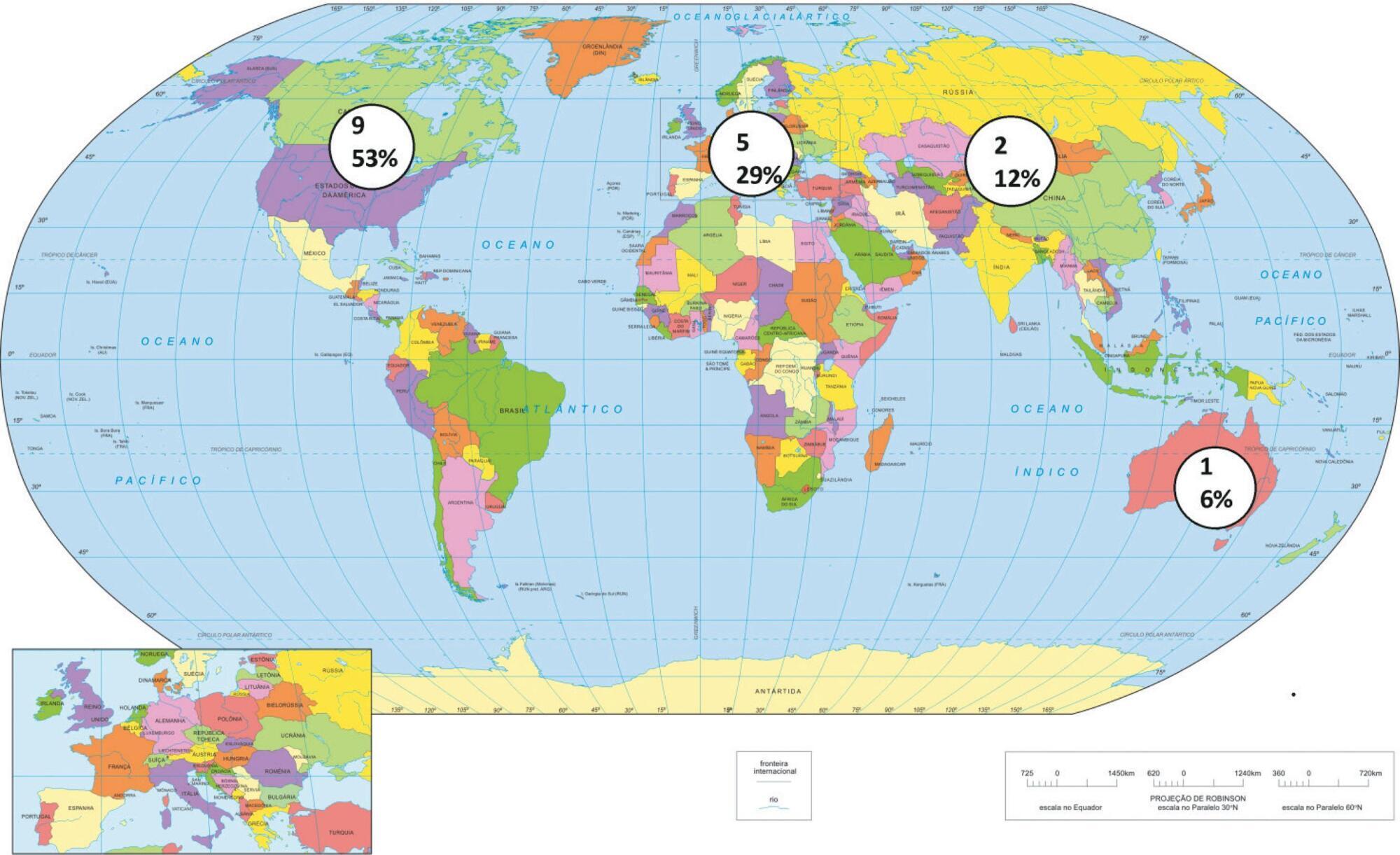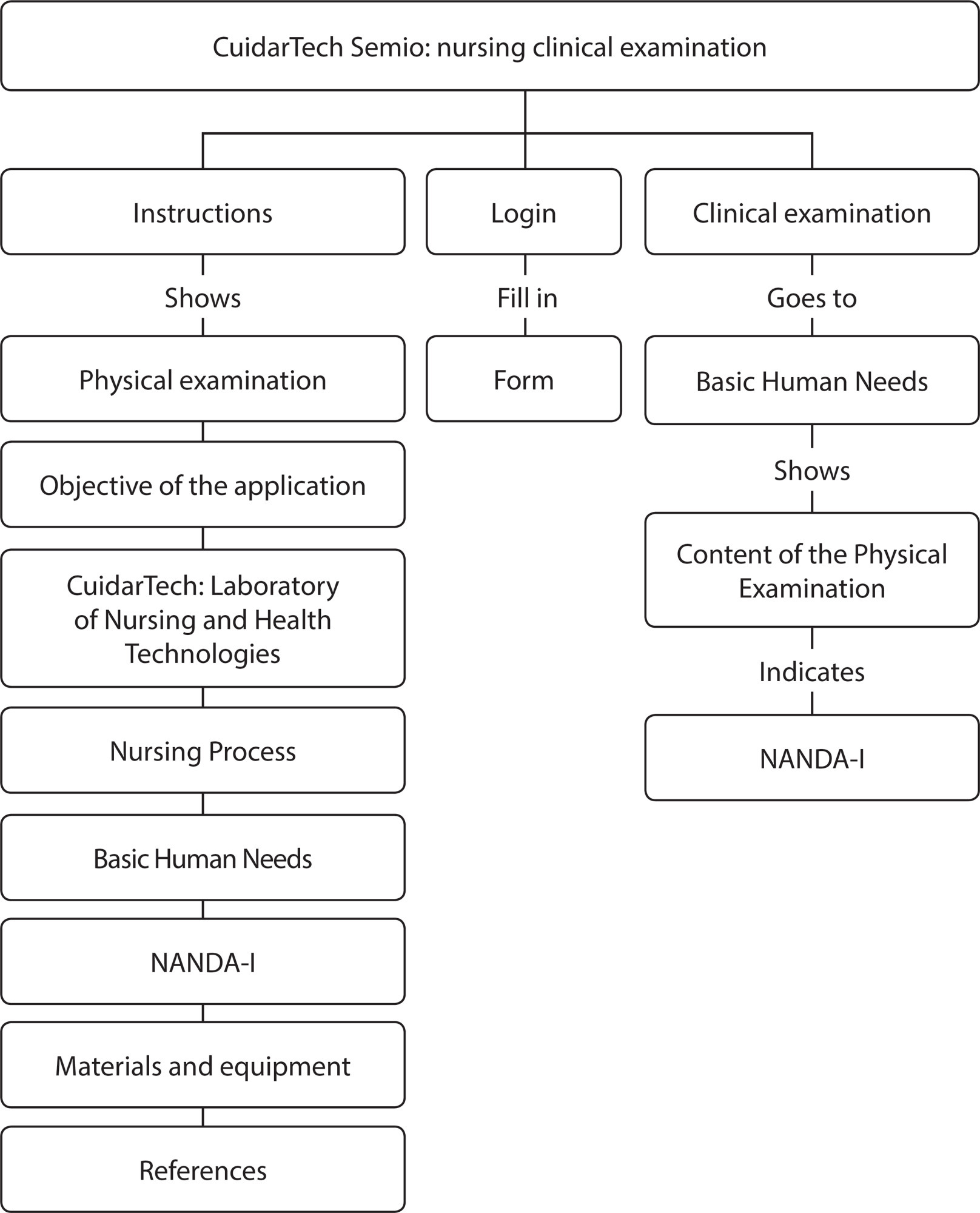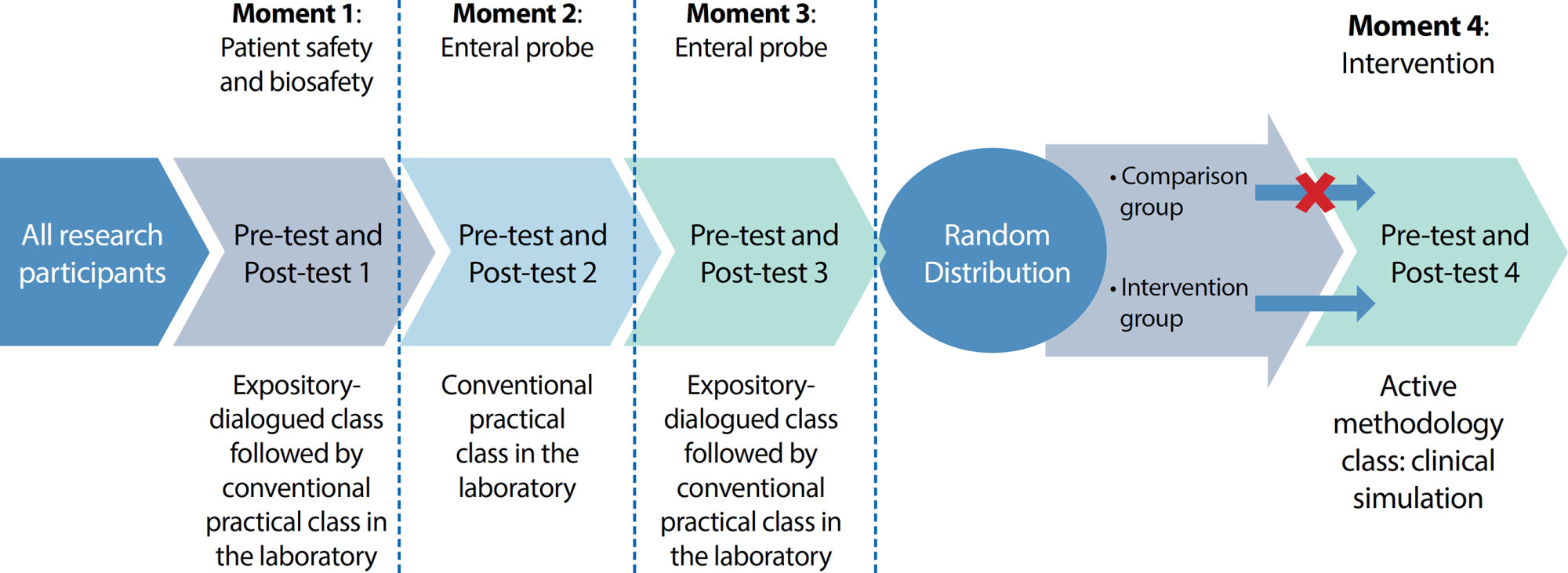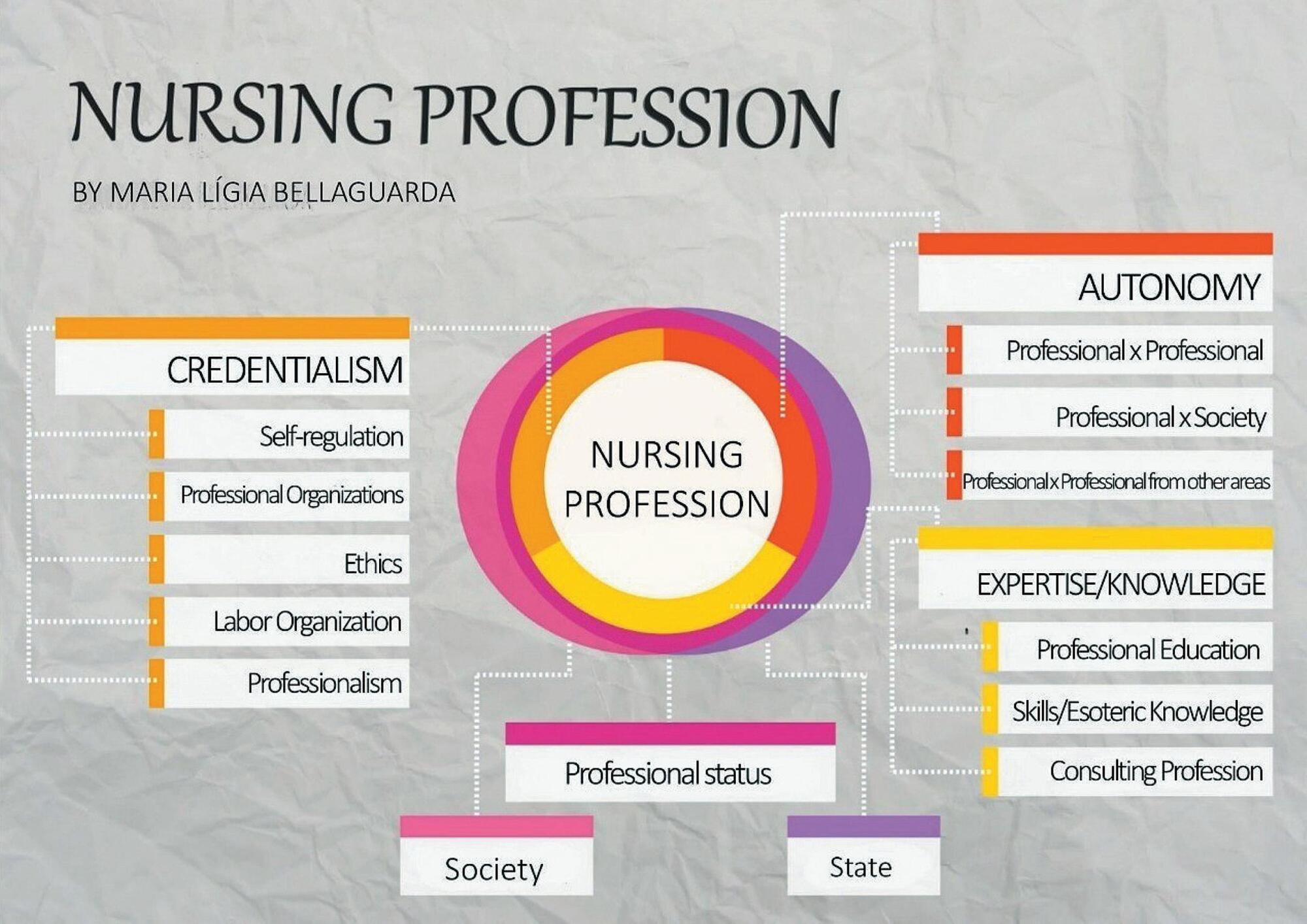-
ORIGINAL ARTICLE
Factors associated with COVID-19 death in pregnant women hospitalized in Intensive Care Units
Revista Brasileira de Enfermagem. 2024;77(5):e20230172
08-26-2024
Abstract
ORIGINAL ARTICLEFactors associated with COVID-19 death in pregnant women hospitalized in Intensive Care Units
Revista Brasileira de Enfermagem. 2024;77(5):e20230172
08-26-2024DOI 10.1590/0034-7167-2023-0172
Views0ABSTRACT
Objectives:
to evaluate the factors associated with COVID-19 death in pregnant women hospitalized in Intensive Care Units in Brazil.
Methods:
this ecological study was conducted using secondary data from Brazilian pregnant women with COVID-19 hospitalized in Intensive Care Units between March 2020 and March 2022. Univariate analysis and logistic regression were employed.
Results:
out of 3,547 pregnant women with COVID-19 hospitalized in Intensive Care Units, 811 died (22.8%). It was found that lack of COVID-19 vaccination (OR: 2.73; 95% CI: 1.83; 4.04), dyspnea (OR: 1.73; 95% CI: 1.17; 2.56), obesity (OR: 1.51; 95% CI: 1.05; 2.17), chronic cardiovascular disease (OR: 1.65; 95% CI: 1.14; 2.38), and non-white race/color (OR: 1.29; 95% CI: 1.00; 1.66) were independently and significantly associated with death.
Conclusions:
it is concluded that vaccination status, presence of comorbidities, and clinical and ethnic-racial characteristics are associated with COVID-19 death in pregnant women hospitalized in Intensive Care Units in Brazil.
Keywords:COVID-19Intensive Care UnitMaternal MortalityPregnant WomenSevere Acute Respiratory SyndromeSee more -
ORIGINAL ARTICLE
Influence of the leukoreduction moment of blood components on the clinical outcomes of transfused patients in the emergency department
Revista Brasileira de Enfermagem. 2024;77(5):e20230293
08-26-2024
Abstract
ORIGINAL ARTICLEInfluence of the leukoreduction moment of blood components on the clinical outcomes of transfused patients in the emergency department
Revista Brasileira de Enfermagem. 2024;77(5):e20230293
08-26-2024DOI 10.1590/0034-7167-2023-0293
Views0ABSTRACT
Objectives:
to investigate the influence of the leukoreduction moment (preor post-storage) of blood components on the clinical outcomes of patients transfused in the emergency department.
Methods:
retrospective cohort study of patients aged 18 years or older who received preor post-storage leukoreduced red blood cell or platelet concentrate in the emergency department and remained in the institution for more than 24 hours. A generalized mixed-effects model was applied in the analyses.
Results:
in a sample of 373 patients (63.27% male, mean age 54.83) and 643 transfusions (69.98% red blood cell), it was identified that the leukoreduction moment influenced the length of hospital stay (p<0.009), but was not dependent on the transfused blood component (p=0.124). The leukoreduction moment had no effect (p>0.050) on transfusion reactions, healthcare-associated infections, or mortality.
Conclusions:
patients who received pre-storage leukoreduced blood components in the emergency department had a shorter length of hospital stay.
Keywords:Blood TransfusionClinical EvolutionEmergency Medical ServiceLeukocyte Reduction ProceduresTransfusion ReactionSee more
-
ORIGINAL ARTICLE
Leadership styles and personal values of professors at a school of nursing
Revista Brasileira de Enfermagem. 2024;77(5):e20230333
08-26-2024
Abstract
ORIGINAL ARTICLELeadership styles and personal values of professors at a school of nursing
Revista Brasileira de Enfermagem. 2024;77(5):e20230333
08-26-2024DOI 10.1590/0034-7167-2023-0333
Views0See moreABSTRACT
Objectives:
to identify professors’ leadership styles and personal values.
Methods:
a quantitative, descriptive-exploratory study. Population was made up of professors in doctoral category 1 at a public university in the state of São Paulo. Data collection took place from June to August 2021. Sociodemographic characterization was extracted, and the Leadership Team Values Assessment was applied. Data were analyzed using measures of central tendency.
Results:
population included 13 professors. The level that represents authentic leadership was the most prevalent. The commitment, positive attitude and trust values stood out. The level portrayed by visionary leadership was the least identified.
Conclusions:
professors’ personal values provide a theoretical basis for guiding and analyzing professors’ leadership styles. Leadership in the educational context must be recognized and studied to promote a more comprehensive and effective approach to developing and improving educational leaders.

-
EDITORIAL
Sexual abuse, abortion and public health in Brazil: when moral judgment accentuates inequities
Revista Brasileira de Enfermagem. 2024;77:e77suppl0401
08-19-2024
Abstract
EDITORIALSexual abuse, abortion and public health in Brazil: when moral judgment accentuates inequities
Revista Brasileira de Enfermagem. 2024;77:e77suppl0401
08-19-2024DOI 10.1590/0034-7167.202477suppl0401
Views0Here is an academic-political editorial that aims to call on the scientific field to reflect on the dangers of decisions regarding the right to abortion under moral rules, since there is no evidence that such a perspective translates into practices of care, protection of childhood and gender equity – elements that are so urgent and […]See more -
ORIGINAL ARTICLE
Bioethical issues in the family health strategy: Considerations for nursing care management
Revista Brasileira de Enfermagem. 2024;77:e20220818
08-19-2024
Abstract
ORIGINAL ARTICLEBioethical issues in the family health strategy: Considerations for nursing care management
Revista Brasileira de Enfermagem. 2024;77:e20220818
08-19-2024DOI 10.1590/0034-7167-2022-0818
Views0See moreABSTRACT
Objective:
To understand the bioethical issues involved in the care management of nurses working in the Family Health Strategy.
Method:
A qualitative study was conducted through five focus groups with 36 nurses selected in the sample. Thematic content analysis was performed based on the bioethical framework, and the synthesis was presented in a conceptual map.
Results:
Bioethical issues were identified in the nursing care practice, related to both specific bioethical themes and the peculiarities of the work. Additionally, challenges and facilitators that interfere with addressing these issues were identified.
Final considerations:
Understanding the bioethical issues involved in the care management of nurses was possible with the theoretical support of different bioethical perspectives. The identified issues relate to persistent and current themes in the field of bioethics. However, some aspects intrinsic to daily practice are still imperceptible to professionals, contributing to the difficulty of discussing bioethics in this care model.

-
ORIGINAL ARTICLE
The use of individual tracking programs in public health: a bioethics dilemma
Revista Brasileira de Enfermagem. 2024;77:e20230041
08-19-2024
Abstract
ORIGINAL ARTICLEThe use of individual tracking programs in public health: a bioethics dilemma
Revista Brasileira de Enfermagem. 2024;77:e20230041
08-19-2024DOI 10.1590/0034-7167-2023-0041
Views0See moreABSTRACT
Objective:
to understand the bioethical perspectives on mobile tracking device use.
Methods:
theoretical study based on action research, carried out with eight graduate students from a public university. A focus group was used, with a thematic content analysis methodology with a codebook structure, approved by the Research Ethics Committee.
Results:
from the analysis, there was a concern about using devices after the pandemic ended. Using or not the device, rights inherent to humans, legislation and effectiveness of methods deepen interpretations, moving participants from a personalistic conception of the topic to a vision focused on professional implications about the methods.
Final considerations:
the debate on the impact of using technological devices on health, especially those that imply restriction of rights that refer to individuals’ private life, involves a discussion of a professional nature, in addition to requirement for clear rules on the topic.
-
EDITORIAL
Abuso sexual, aborto e saúde pública no brasil: quando o julgamento moral acentua as iniquidades
Revista Brasileira de Enfermagem. 2024;77:e77suppl0401
08-19-2024
Abstract
EDITORIALAbuso sexual, aborto e saúde pública no brasil: quando o julgamento moral acentua as iniquidades
Revista Brasileira de Enfermagem. 2024;77:e77suppl0401
08-19-2024DOI 10.1590/0034-7167.202477suppl0401pt
Views0Eis aqui um editorial acadêmico-político que tem como objetivo convocar o campo científico a refletir sobre os perigos das decisões relativas ao direito ao aborto sob réguas morais, uma vez que não há evidências de que tal perspectiva se traduza em práticas de cuidado, proteção à infância e equidade de gênero – elementos tão urgentes […]See more -
ORIGINAL ARTICLE
Mental health of parents of children and adolescents who require special health care
Revista Brasileira de Enfermagem. 2024;77(3):e20230457
07-29-2024
Abstract
ORIGINAL ARTICLEMental health of parents of children and adolescents who require special health care
Revista Brasileira de Enfermagem. 2024;77(3):e20230457
07-29-2024DOI 10.1590/0034-7167-2023-0457
Views0See moreABSTRACT
Objective:
To identify the manifestations presented by parents of children and adolescents who require special health attention that can impact their mental health.
Methods:
exploratory, qualitative research, based on the concept of vulnerability, with data collection carried out through interviews with 18 parents of children and adolescents with special health care needs, hospitalized in the pediatric ward of a hospital in Paraná, between May/2017 and May/ 2018. Data analyzed by inductive thematic analysis.
Results:
parents experienced situations of vulnerability when providing care at home, with repercussions on their mental health, expressed by manifestations of lack of protection, anxiety and depression.
Final considerations:
It is important that health professionals seek to expand actions to promote care and reduce situations that generate threats, insecurities, concerns and damage to the health of parents, which can impact and further weaken care for children and adolescents who need attention especially health.
-
REVIEW
Mental health interventions implemented in the COVID-19 pandemic: what is the evidence?
Revista Brasileira de Enfermagem. 2021;74:e20200635
06-11-2021
Abstract
REVIEWMental health interventions implemented in the COVID-19 pandemic: what is the evidence?
Revista Brasileira de Enfermagem. 2021;74:e20200635
06-11-2021DOI 10.1590/0034-7167-2020-0635
Views0See moreABSTRACT
Objective:
to map the evidence on mental health interventions implemented during the COVID-19 pandemic.
Method:
this scoping review was carried out in the MEDLINE/PubMed, SCOPUS, Web of Science, PsycINFO, and Science Direct databases and in the medRxiv, bioRxiv, and PsyArXiv preprints servers using the descriptors “Covid-19”, “coronavirus infection”, “coronavirus”, “2019-nCoV”, “2019 novel coronavirus disease”, “SARS-CoV-2”, “health personnel”, “general public”, and “mental health”.
Results:
eight articles were selected and categorized into mental health interventions for the population, among which mental health interventions were for people diagnosed with suspicion/confirmed COVID-19 and mental health interventions for health professionals.
Conclusion:
telemonitoring, virtual games and strategies focused on social support and muscle relaxation techniques, characterized as non-pharmacological and low-cost, were shown as interventions, which, since they are effective, need to be encouraged and included in mental health care practices.

-
Nursing performance in robotic surgeries: integrative review
Revista Brasileira de Enfermagem. 2019;72(3):795-800
06-07-2019
Abstract
Nursing performance in robotic surgeries: integrative review
Revista Brasileira de Enfermagem. 2019;72(3):795-800
06-07-2019DOI 10.1590/0034-7167-2018-0426
Views0ABSTRACT
Objective:
To know the scientific production on the performance of the nursing staff in robotic surgeries, identifying the role of the nurse in the three perioperative periods.
Methods:
Integrative review, search in the databases National Library of Medicine, National Institutes of Health, Scientific Electronic Library Online and Biblioteca Virtual em Saúde, performed from June to September, 2017; 17 selected articles met the inclusion criteria.
Results:
Most articles were published in foreign journals in English, nine in the United States, classified with evidence level of 4 and 5. The role of nursing in the perioperative period was identified, related mainly to patient safety. The most mentioned perioperative period in the articles was the intraoperative, with greater concern in the positioning of the patient.
Conclusion:
The nursing performance and patient safety in robotic surgeries are similar to the ones in major surgeries, requiring from the patient a specific knowledge on the setting and preparation of the robot.
Keywords:Nurse's RolePerioperative NursingRoboticsSurgical Procedures, OperativeTechnological DevelopmentSee more
-
ORIGINAL ARTICLE
“Waiting for a miracle”: Spirituality/Religiosity in coping with sickle cell disease
Revista Brasileira de Enfermagem. 2019;72(6):1554-1561
10-21-2019
Abstract
ORIGINAL ARTICLE“Waiting for a miracle”: Spirituality/Religiosity in coping with sickle cell disease
Revista Brasileira de Enfermagem. 2019;72(6):1554-1561
10-21-2019DOI 10.1590/0034-7167-2018-0635
Views0See moreABSTRACT
Objective:
To understand spirituality/religiosity as experienced by people with sickle cell disease, and its influence on coping with the disease.
Method:
A qualitative, descriptive, and exploratory study conducted in the State of Bahia. Twenty-nine respondents participated in semi-structured interviews. Content analysis was used to analyze the empirical material.
Results:
Individuals with sickle cell disease experience spirituality/religiosity motivated by their hope for a miracle, and fear of death; among their rites are: reading religious materials, individual and group prayer, and attendance at worship services. The effects on their health include: comfort by means of coping by comparing two evils, anxiety relief, social support, and lifestyle changes; however, spirituality/religiosity may be impaired.
Final considerations:
This study demonstrates the need to qualify health professionals to address spiritual issues of these individuals during illness, with the aims of diagnosing suffering and anguish, and providing care, comfort and strengthening of the spiritual bonds of these individuals.
-
ORIGINAL ARTICLE
Construction and validation of a mobile application for development of nursing history and diagnosis
Revista Brasileira de Enfermagem. 2020;73:e20190674
12-21-2020
Abstract
ORIGINAL ARTICLEConstruction and validation of a mobile application for development of nursing history and diagnosis
Revista Brasileira de Enfermagem. 2020;73:e20190674
12-21-2020DOI 10.1590/0034-7167-2019-0674
Views0ABSTRACT
Objectives:
to describe the construction and validation process for a mobile application for development of the nursing history and diagnosis.
Methods:
methodological study conducted in 2018 in three stages: content creation, based on the Basic Human Needs categories and nursing diagnoses; content assessment by nine nursing judges, with calculation of the content validity index; and construction of the application, which included definition of the requirements, a conceptual map, implementation and prototyping options, tests and implementation.
Results:
the application was organized by sections: Grouped Basic Human Needs, Cranial pair tests, Clinical assessment scales and Additional tests. Two section were adjusted according to the judges’ suggestions.
Final Considerations:
it is the first application produced in Brazil based on the Basic Human Need categories, which enables quick access to information, concepts and typical nomenclatures of semiology, recording of clinical data and definition of nursing diagnoses.
Keywords:Educational TechnologyMobile ApplicationsNursing InformaticsNursing ProcessPhysical ExaminationSmartphoneSee more
-
ORIGINAL ARTICLE
Factors associated with vulnerability and fragility in the elderly: a cross-sectional study
Revista Brasileira de Enfermagem. 2022;75(2):e20200399
10-01-2022
Abstract
ORIGINAL ARTICLEFactors associated with vulnerability and fragility in the elderly: a cross-sectional study
Revista Brasileira de Enfermagem. 2022;75(2):e20200399
10-01-2022DOI 10.1590/0034-7167-2020-0399
Views0See moreABSTRACT
Objectives:
to assess factors associated with vulnerability and fragility in the elderly.
Methods:
crosssectional study with 384 elderly people in Fortaleza, Ceará. The Vulnerable Elders Survey and Clinical-Functional Vulnerability Index – 20 were used. Chi-square and Fisher’s exact tests were used for associations. In the analysis of the combined influence of risk factors, the stepwise logistic regression and multinomial regression methods were adopted.
Results:
251 (65.4%) non-vulnerable and 133 (34.6%) vulnerable elders. From the vulnerable elders analyzed, 42 (30.9%) are at high risk for frailty. Factors associated with vulnerability: age, gender, presence of comorbidities, hypertension, diabetes, osteoporosis and use of polypharmacy. There is a 30% increase in the chance of vulnerability for each additional drug. Physical activity reduces the chance of vulnerability by 60%. Factors associated with frailty: educational level; self-perception of health; comorbidities; polypharmacy.
Conclusions:
it is important to pay attention to the presence of arterial hypertension, osteoporosis, polypharmacy, and encourage the practice of physical activity.
-
ORIGINAL ARTICLE
Caring ability, burden, stress and coping of family caregivers of people in cancer treatment
Revista Brasileira de Enfermagem. 2019;72(6):1541-1546
10-21-2019
Abstract
ORIGINAL ARTICLECaring ability, burden, stress and coping of family caregivers of people in cancer treatment
Revista Brasileira de Enfermagem. 2019;72(6):1541-1546
10-21-2019DOI 10.1590/0034-7167-2018-0605
Views0See moreABSTRACT
Objective:
To analyze the association between the caring ability and the burden, stress and coping of family caregivers of people in cancer treatment.
Method:
A cross-sectional study with 132 family caregivers. The following instruments were applied: a characterization instrument, the Caring Ability Inventory, the Zarit Burden Interview, the Perceived Stress Scale, and the Brief COPE. The Spearman Correlation was used with significance ≤5%.
Results:
There were significant and positive correlations between total caring ability and: burden – interpersonal relationship (p=0.03); stress (p=0.02) and maladaptive coping (p=0.00); and inversely proportional correlations with problem-focused coping (p=0.03). The courage had inversely proportional correlation with: self-efficacy (p=0.03), interpersonal relationship (p=0.00), stress (p=0.04) and maladaptive coping (p=0.00). The knowledge had significant and positive correlation with problem-focused coping (p=0.00), adaptive coping (p=0.01), and inverse correlation with stress (p=0.02).
Conclusion:
The level of caring ability correlates with levels of stress and burden, and with the type of coping strategy used by family caregivers.
-
ORIGINAL ARTICLE
Clinical simulation as a Nursing Fundamentals teaching method: a quasi-experimental study
Revista Brasileira de Enfermagem. 2022;75(2):e20201155
10-18-2022
Abstract
ORIGINAL ARTICLEClinical simulation as a Nursing Fundamentals teaching method: a quasi-experimental study
Revista Brasileira de Enfermagem. 2022;75(2):e20201155
10-18-2022DOI 10.1590/0034-7167-2020-1155
Views0See moreABSTRACT
Objectives:
to evaluate students’ knowledge gain after the implementation of clinical simulation in Nursing Fundamentals disciplines.
Methods:
a quasi-experimental intervention was carried out with 60 students, distributed in comparison and intervention groups, who underwent traditional teaching and traditional teaching associated with simulated teaching, respectively. Pre-test and post-test instruments were applied to both groups.
Results:
after analyzing the students’ performance through the applied instruments, both groups had a cognitive evolution along with the taught content, however, when compared, the intervention group obtained a higher knowledge gain than the comparison group (p = 0.016), demonstrating progressive and increasing improvement with the use of the methodology.
Conclusions:
simulated teaching significantly helps students in gaining technical-cognitive knowledge. Therefore, it is recommended to adhere to the use of this methodology for teaching Nursing Fundamentals.

-
ORIGINAL ARTICLE
Eliot Freidson’s sociology of professions: an interpretation for Health and Nursing
Revista Brasileira de Enfermagem. 2020;73(6):e20180950
08-10-2020
Abstract
ORIGINAL ARTICLEEliot Freidson’s sociology of professions: an interpretation for Health and Nursing
Revista Brasileira de Enfermagem. 2020;73(6):e20180950
08-10-2020DOI 10.1590/0034-7167-2018-0950
Views0See moreABSTRACT
Objectives:
to analyze theoretical conceptions of Eliot Freidson’s Sociology of Professions scoped on health and nursing professions.
Methods:
Eight nurses were interviewed, all involved in the development of the professional Council on the timeframe from 1975 to 1986. Documental resources were Laws, Ordinances, Resolutions, Reports, Meeting Minutes and Public Deeds. Information was organized as from literature and Eliot Freidson’s conceptions, and thematic content analysis was carried out.
Results:
the concepts authored by Eliot Freidson allowed for the development of a concept chart that portrays the nursing profession and that may be expanded for the other occupations in the health field, in consonance with professional organization in the country.
Final Considerations:
Eliot Freidson’s framework, in interpretation for nursing, consolidates the profession with relative autonomy, expertise by Nursing Care Systematization and credentialism by professional normalizations.

Search
Search in:
Nuvem de Tags
Aged (144) Atenção Primária à Saúde (239) COVID-19 (104) Cuidados de Enfermagem (269) Educação em Enfermagem (151) Educação em Saúde (139) Enfermagem (930) Estudos de Validação (131) Health Education (144) Idoso (208) Mental Health (149) Nursing (987) Nursing Care (306) Patient Safety (151) Primary Health Care (284) Qualidade de Vida (104) Quality of Life (106) Saúde Mental (145) Segurança do Paciente (150) Validation Studies (108)



